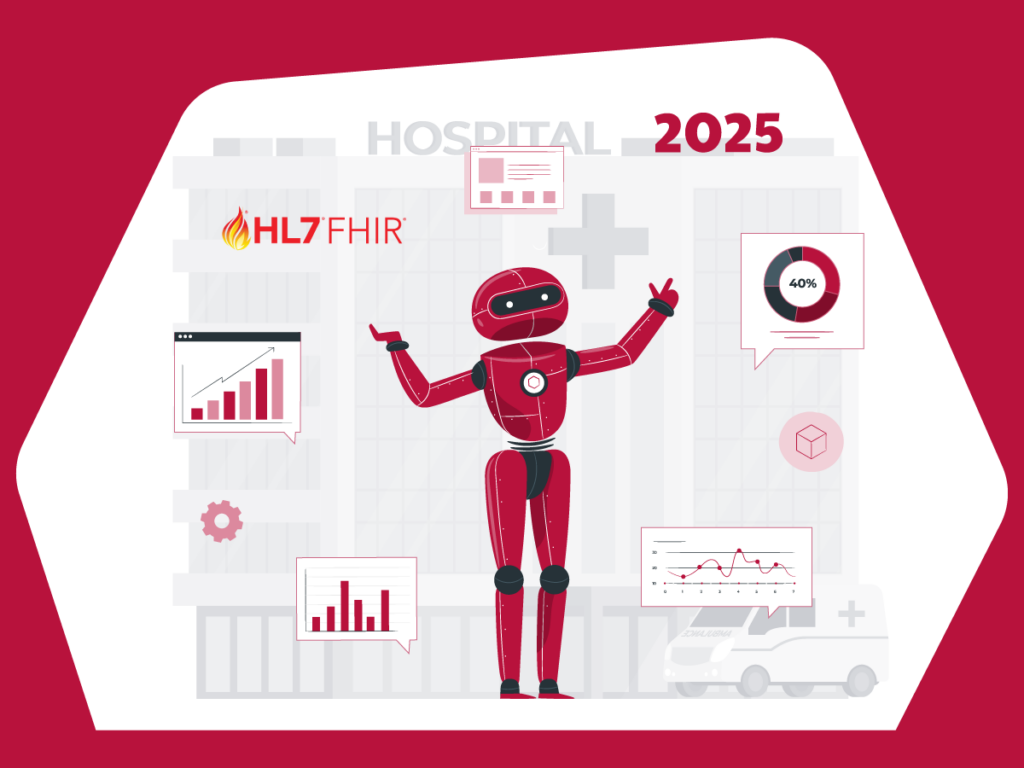
The Future of Health Tech and FHIR in 2025: Predictions and Insights
The healthcare industry is on the brink of a major transformation, with technology poised to reshape everything from patient care to operational efficiency. In 2025, we expect to see significant advancements in health tech, driven by innovations in data interoperability, AI, and personalized medicine. One of the most promising developments will be the deeper integration of the FHIR (Fast Healthcare Interoperability Resources) standard into clinical workflows, pushing the boundaries of data exchange and improving patient outcomes. FHIR’s ability to streamline the communication of medical information across disparate systems will be key in advancing the seamless exchange of health data between hospitals, clinics, insurers, and third-party service providers.
The evolution of the FHIR standard will likely move beyond its current role as a data format for electronic health records (EHRs) and become a foundational tool for real-time, dynamic patient data sharing. In 2025, we can expect FHIR to become more refined, with enhanced security protocols, real-time capabilities, and greater standardization for the integration of wearable devices, mobile health apps, and telehealth services. This will empower healthcare providers to make more informed decisions by leveraging continuous, up-to-date patient data. Additionally, FHIR will likely enable better interoperability with AI-driven platforms, allowing for smarter decision-making and predictive analytics that help identify emerging health trends and tailor treatments to individual patients.
The rapid development of artificial intelligence (AI) and machine learning in healthcare will also significantly impact the FHIR ecosystem by enabling more advanced data analysis capabilities. By 2025, AI algorithms could be integrated directly into EHR systems, offering predictive analytics for clinical decision support, operational optimization, and even early disease detection. With the interoperability provided by FHIR, AI tools will be able to process vast amounts of health data from multiple sources in real-time, offering personalized treatment plans, optimizing hospital workflows, and enhancing patient outcomes. The combination of AI and FHIR will enable a more proactive, preventative healthcare model—shifting from reactive care to preventative care.
Telemedicine and remote patient monitoring (RPM) will continue to gain prominence in 2025, particularly as health systems adopt more digital health platforms. This will likely create an increased demand for advanced health tech solutions that can provide seamless integration between telemedicine services and traditional in-person care. In this environment, health tech labs and innovation hubs will play a crucial role in developing solutions that address the specific needs of healthcare providers, patients, and insurers. As telehealth becomes an everyday part of healthcare delivery, the role of health tech labs in optimizing telemedicine solutions, ensuring secure data sharing, and facilitating the adoption of technologies like virtual care platforms will be pivotal in supporting the future of healthcare.
Amidst these changes, Itirra, a Washington-based health tech lab with over a decade of experience, is positioning itself as a leader in shaping the future of health technology. With a track record of successful collaborations with Physician Advisors, Revenue Cycle Management companies and any other organization that services the healthcare industry Itirra specializes in delivering bespoke solutions that optimize operations and improve patient care. By leveraging its deep expertise in health IT, Itirra helps organizations navigate the complexities of FHIR implementation, system integration, and data analytics. As the healthcare landscape evolves, Itirra’s agility and hands-on approach will be critical in helping its clients stay ahead of the curve, ensuring that they are ready to meet the challenges of 2025 and beyond.
Itirra’s unique ability to understand the intricate dynamics between technology, healthcare policy, and operational needs makes it an invaluable partner for any organization looking to innovate in the health tech space. Whether developing customized solutions for streamlining EHR systems, enhancing patient engagement platforms, or building AI-driven predictive models, Itirra’s team of experts brings a wealth of knowledge to the table. Their commitment to providing tailored, high-quality solutions ensures that healthcare organizations not only keep up with the rapid pace of technological change but also thrive in an increasingly complex healthcare environment. As we look ahead to 2025, Itirra will undoubtedly continue to play a key role in helping the industry unlock the full potential of health technology.
In conclusion, the future of health tech in 2025 is one of greater connectivity, smarter data usage, and patient-centered care. The further refinement and adoption of FHIR will provide the necessary framework for a more interoperable healthcare ecosystem, while innovations in AI and remote care will open up new frontiers in precision medicine and operational efficiency. Health tech labs like Itirra, with their proven expertise in developing tailored solutions, will be at the forefront of this transformation, ensuring that healthcare providers are equipped with the tools they need to succeed in a rapidly evolving digital landscape. With patient care at the core of every advancement, the health tech of 2025 will empower both patients and providers to reach new heights of efficiency, personalization, and well-being.
Contact Itirra today to learn more!

